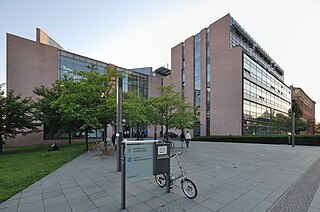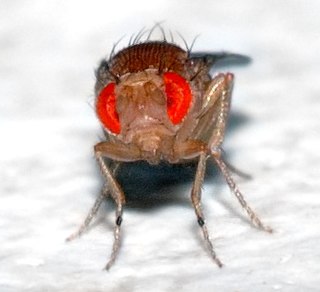
Caenorhabditis elegans is a free-living transparent nematode about 1 mm in length that lives in temperate soil environments. It is the type species of its genus. The name is a blend of the Greek caeno- (recent), rhabditis (rod-like) and Latin elegans (elegant). In 1900, Maupas initially named it Rhabditides elegans. Osche placed it in the subgenus Caenorhabditis in 1952, and in 1955, Dougherty raised Caenorhabditis to the status of genus.

Howard Robert Horvitz ForMemRS NAS AAA&S APS NAM is an American biologist whose research on the nematode worm Caenorhabditis elegans, was awarded the 2002 Nobel Prize in Physiology or Medicine, together with Sydney Brenner and John E. Sulston, whose "seminal discoveries concerning the genetic regulation of organ development and programmed cell death" were "important for medical research and have shed new light on the pathogenesis of many diseases".

Sir John Edward Sulston was a British biologist and academic who won the Nobel Prize in Physiology or Medicine for his work on the cell lineage and genome of the worm Caenorhabditis elegans in 2002 with his colleagues Sydney Brenner and Robert Horvitz at the MRC Laboratory of Molecular Biology. He was a leader in human genome research and Chair of the Institute for Science, Ethics and Innovation at the University of Manchester. Sulston was in favour of science in the public interest, such as free public access of scientific information and against the patenting of genes and the privatisation of genetic technologies.
Current Protocols is a series of laboratory manuals for life scientists. The first title, Current Protocols in Molecular Biology, was established in 1987 by the founding editors Frederick M. Ausubel, Roger Brent, Robert Kingston, David Moore, Jon Seidman, Kevin Struhl, and John A. Smith of the Massachusetts General Hospital Department of Molecular Biology and the Harvard Medical School Departments of Genetics and Biological Chemistry, and Sarah Greene of Greene Publishing Associates The Current Protocols series entered into a partnership with Wiley-Interscience, John Wiley and Sons, was acquired by Wiley in 1995, and continued to introduce additional titles. Scientists contribute methods that are peer-reviewed by one of 18 editorial boards. The core content of each title is updated quarterly, and new material is added. In 2009, the Current Protocols website was launched, with online versions of all of the texts, research tools, video protocols, and a blog. Several Current Protocols titles are indexed in MEDLINE and searchable by PubMed: CP Molecular Biology, CP Immunology, CP Cell Biology, CP Protein Science, CP Microbiology.
Host tropism is the infection specificity of certain pathogens to particular hosts and host tissues. This explains why most pathogens are only capable of infecting a limited range of host organisms.

The Max Planck Institute for Infection Biology (MPIIB) is a non-university research institute of the Max Planck Society located in the heart of Berlin in Berlin-Mitte. It was founded in 1993. Arturo Zychlinsky is currently the Managing Director. The MPIIB is divided into nine research groups, two partner groups and two Emeritus Groups of the founding director Stefan H. E. Kaufmann and the director emeritus Thomas F. Meyer. The department "Regulation in Infection Biology" headed by 2020 Nobel laureate Emmanuelle Charpentier was hived off as an independent research center in May 2018. The Max Planck Unit for the Science of Pathogens is now administratively independent of the Max Planck Institute for Infection Biology. In October 2019, Igor Iatsenko and Matthieu Domenech de Cellès established their research groups at the institute, Mark Cronan started his position as research group leader in March 2020. Silvia Portugal joined the institute in June 2020 as Lise Meitner Group Leader. Two more research groups where added in 2020, Felix M. Key joined in September and Olivia Majer in October, completing the reorganization of the Max Planck Institute for Infection Biology. Simone Reber joined as Max Planck Fellow in 2023 and now heads the research group Quantitative Biology.

Most animal testing involves invertebrates, especially Drosophila melanogaster, a fruit fly, and Caenorhabditis elegans, a nematode. These animals offer scientists many advantages over vertebrates, including their short life cycle, simple anatomy and the ease with which large numbers of individuals may be studied. Invertebrates are often cost-effective, as thousands of flies or nematodes can be housed in a single room.
Barbara J. Meyer is a biologist and genetist, noted for her pioneering research on lambda phage, a virus that infects bacteria; discovery of the master control gene involved in sex determination; and studies of gene regulation, particularly dosage compensation. Meyer's work has revealed mechanisms of sex determination and dosage compensation—that balance X-chromosome gene expression between the sexes in Caenorhabditis elegans that continue to serve as the foundation of diverse areas of study on chromosome structure and function today.
Gary Bruce Ruvkun is an American molecular biologist and Nobel laureate at Massachusetts General Hospital and professor of genetics at Harvard Medical School in Boston.
Jonathan Alan Hodgkin is a British biochemist. He is the Professor of Genetics at the University of Oxford and an emeritus fellow of Keble College, Oxford.
Andrew D. Luster is the Persis, Cyrus and Marlow B. Harrison Professor of Medicine at Harvard Medical School, and the Chief of the Division of Rheumatology, Allergy and Immunology at Massachusetts General Hospital. He is Director of its Research Center for Immunology and Inflammatory Diseases, and a member of the Dana-Farber/Harvard Cancer Center's Cancer Immunology program.
Jorge Enrique Galán is an Argentinian-American microbiologist who specializes in infectious disease, bacterial pathogenesis including Salmonella.

Caenorhabditis elegans- microbe interactions are defined as any interaction that encompasses the association with microbes that temporarily or permanently live in or on the nematode C. elegans. The microbes can engage in a commensal, mutualistic or pathogenic interaction with the host. These include bacterial, viral, unicellular eukaryotic, and fungal interactions. In nature C. elegans harbours a diverse set of microbes. In contrast, C. elegans strains that are cultivated in laboratories for research purposes have lost the natural associated microbial communities and are commonly maintained on a single bacterial strain, Escherichia coli OP50. However, E. coli OP50 does not allow for reverse genetic screens because RNAi libraries have only been generated in strain HT115. This limits the ability to study bacterial effects on host phenotypes. The host microbe interactions of C. elegans are closely studied because of their orthologs in humans. Therefore, the better we understand the host interactions of C. elegans the better we can understand the host interactions within the human body.
Nematocida parisii is a parasitic species of Microsporidia fungi found in wild isolates of the common nematode, Caenorhabditis elegans. The fungus forms spores and replicates in the intestines before leaving the host.
Alejandro Aballay is an American biologist, currently Dean of The University of Texas MD Anderson Cancer Center UTHealth Houston Graduate School of Biomedical Sciences. Aballay was Professor and Chair of the Department of Molecular Microbiology & Immunology at Oregon Health & Science University until 2024. Before that, Aballay was Professor and the Director of the Center for Host-Microbial Interactions at Duke University School of Medicine until 2017. In 2013, he was elected to the American Association for the Advancement of Science.
Laurence G. Rahme is an American microbiologist who is Professor of Surgery and Microbiology at Harvard Medical School (HMS). At Massachusetts General Hospital (MGH) she also holds the title of Director of the Molecular Surgical Laboratory as a microbiologist in the Department of Surgery and Molecular Biology. Additionally, she holds a Senior Scientific Staff position at Shriners Hospitals for Children-Boston.
Susan R. Weiss is an American microbiologist who is a Professor of Microbiology at the Perelman School of Medicine at the University of Pennsylvania. She holds vice chair positions for the Department of Microbiology and for Faculty Development. Her research considers the biology of coronaviruses, including SARS, MERS and SARS-CoV-2. As of March 2020, Weiss serves as Co-Director of the University of Pennsylvania/Penn Medicine Center for Research on Coronavirus and Other Emerging Pathogens.
Jen Sheen is a biologist at Massachusetts General Hospital and Harvard Medical School who is known for her work on plant signaling networks. She is an elected member of the American Association for the Advancement of Science.
Theresa Marie Koehler is an American microbiologist who is the Herbert L. and Margaret W. DuPont Distinguished Professor in Biomedical Sciences and Chair of the Department of Microbiology and Molecular Genetics at McGovern Medical School. She is known for her extensive research on anthrax and was elected Fellow of the American Association for the Advancement of Science in 2021. As of July 1, 2024, Koehler is the President of the American Society for Microbiology for the 2024-2025 year.
Papiliotrema laurentii is a species of fungus in the family Rhynchogastremaceae. It is typically isolated in its yeast state.






